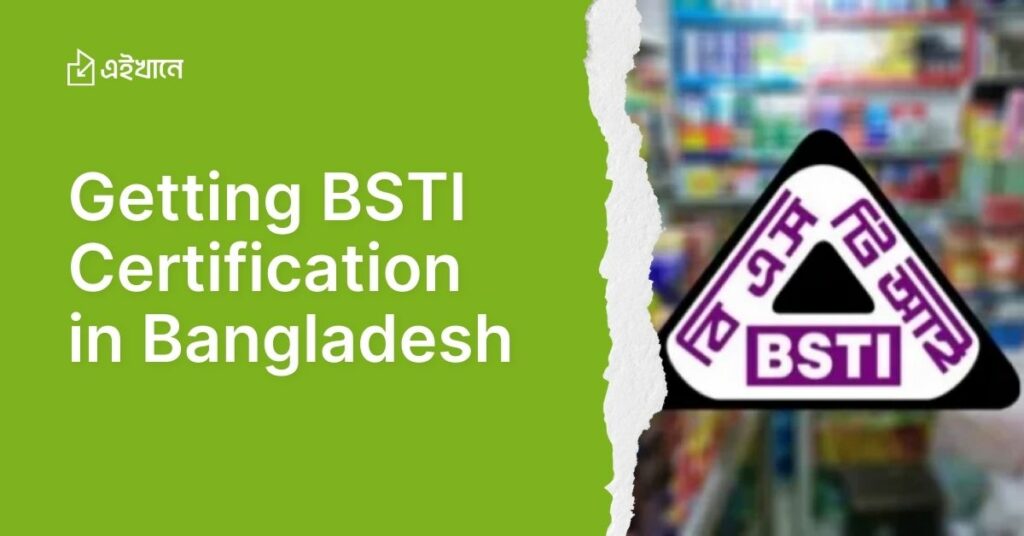Step-by-Step Guide to Obtaining BSTI Certification for Your Products in Bangladesh
Step 1: Determine if Your Product Requires BSTI Certification
Before initiating the certification process, it is crucial to determine whether your product falls under the mandatory list of items that require Bangladesh Standards and Testing Institution (BSTI) certification. BSTI provides a list of categories and products where certification is essential for legal sale in Bangladesh. The list can be found on the official BSTI website.
Step 2: Submit the Application for Certification
Once you have confirmed that your product requires certification, the next step is to formally apply to BSTI. The application form can either be collected from the BSTI office or downloaded from their official website. Complete the form with all necessary details, including company information and product specifications. Ensure that all the documents required are attached, such as trade license, product formulation, packaging details, and other relevant information.
Step 3: Pay the Necessary Fees
After submitting the application, you will need to pay the applicable processing fees. BSTI has a structured fee schedule based on the type of product and the scale of testing needed. Payment can be made via bank transfer or at designated financial institutions. Retain proof of payment, as this will be necessary for later verification.
Step 4: Product Testing and Sample Submission
Following submission of your application and payment, BSTI will request samples of your product for testing. It’s important to provide properly labeled and packaged samples that reflect the final commercial product. These samples will undergo rigorous testing in BSTI laboratories to ensure they meet the relevant Bangladesh standards.
Step 5: Factory Inspection (if applicable)
For certain food, electrical, and safety-related products, BSTI may require a physical inspection of the production facility. This ensures that your manufacturing processes comply with the necessary health, safety, and environmental standards. BSTI officials will inspect your factory and provide feedback on any areas needing improvement.
Step 6: Review and Approval Process
Once product testing and factory inspections are complete, BSTI will conduct a thorough review of the results. If your product meets the required national standards, BSTI will grant approval for certification. This can take several weeks depending on the complexity of the product and the workload at BSTI.
Step 7: Issuance of BSTI Certification
Upon successful review, BSTI will issue an official certificate authorizing your product to carry the BSTI mark of quality. This certification allows you to market and sell your product across Bangladesh legally. You will receive a certificate that includes registration and reference numbers, which should be referenced in your product labels and packaging.
Step 8: Renewal and Ongoing Compliance
BSTI certifications are typically valid for a specific period, after which they need to be renewed. You will be required to submit renewal requests before the expiration date, accompanied by updated product information and testing, if necessary. Ensure ongoing compliance with BSTI standards through regular internal quality checks and re-certification to prevent disruptions in your business.
Understanding the Requirements and Documentation for BSTI Certification Process
Identifying the Necessary Product Standards
Before starting the certification process, it’s essential to understand the specific standards your product must comply with. BSTI sets out clear guidelines for different product categories, including food, electrical goods, construction materials, and more. These standards outline the technical requirements for safety, performance, and quality that your product must meet. A thorough review of these standards will ensure that you are aware of the benchmarks against which your product will be tested.
Gathering Required Documents for Application
The documentation needed for the BSTI certification process is extensive and varies depending on the product category. Common documents include product specifications, a certificate of origin, trade licenses, and packaging material descriptions. For certain products such as packaged foods or pharmaceuticals, additional documents such as formulation details, ingredient lists, and manufacturing process documents may be required. All the paperwork should be accurate and up-to-date to avoid delays during the review process.
Labeling and Packaging Compliance
A critical aspect of BSTI certification involves ensuring that your product labeling and packaging meet Bangladesh’s regulatory standards. Labels must provide clear and accurate information regarding the product name, manufacturer details, country of origin, net weight, and other relevant details. For food items, nutritional information and expiration dates are mandatory. Your draft labeling should be submitted along with the application for approval to prevent future issues with non-compliance.
Factory Registration and Operational Clearance
In addition to documentation related to the product, companies manufacturing or importing goods might also need to submit factory registration papers or operational clearance certificates. This documentation ensures that your production facility or supply chain processes are legitimate and traceable. If you are a foreign manufacturer, you may need to work with a local representative to fulfill this requirement. Having these documents ready ahead of time can expedite the factory inspection phase (if applicable).
Proof of Payment and Financial Records
Part of the BSTI certification application includes payment of various fees for testing, factory inspections, and processing your application. It’s crucial to retain all proof of payments, including receipts or transaction records with the appropriate BSTI references. These financial documents will need to be submitted along with your application to complete the initial steps in the certification process. Missing or inaccurate proof of payment could result in delays or rejection of your application.
Understanding Product Testing Requirements
For most products, testing at BSTI-accredited laboratories is mandatory. You will have to submit samples of your product to undergo rigorous testing according to the relevant standards. During this step, you must ensure that your product samples are exactly as they would appear when sold commercially. In addition to providing samples, you must submit a full dossier of the test methods you employed during internal quality checks, if applicable.
Timeline and Costs Associated with BSTI Certification in Bangladesh
Estimated Timeline for the BSTI Certification Process
The timeline for obtaining BSTI certification in Bangladesh can vary depending on several factors, including the type of product, the complexity of the testing required, and the workload at the BSTI laboratories. On average, the entire process takes anywhere from 30 to 90 working days. The timeline starts from the moment you submit your application and continues through the steps of document review, product testing, factory inspections (if required), and final approval. Delays may occur if there are issues with documentation or if products fail initial testing, requiring re-submission or further adjustments.
For businesses seeking rapid market entry, it is advisable to plan months in advance due to potential bottlenecks in testing or inspections that could lengthen the overall timeline.
Fees Associated with Application Submission
At the initial stage of applying for BSTI certification, businesses are required to pay a non-refundable application processing fee. This fee covers the administrative costs associated with reviewing the application and documents provided. The amount varies based on the product category and whether the applicant is a local manufacturer or an importer. Businesses should consult the latest BSTI regulations for the most up-to-date application fee structure.
It’s important to note that this payment is separate from other fees related to testing, inspection, or renewal processes. Failure to complete the payment in full could result in the rejection of the application.
Costs of Testing and Product Evaluation
One of the more substantial costs associated with BSTI certification is product testing. Different products require varying levels of testing to determine if they meet national quality, safety, and labeling standards as specified by BSTI. Testing fees depend on the specific requirements of each product category. For instance, food products undergo microbiological and chemical analysis, while electrical items are subjected to safety and performance tests.
The average cost of testing can range from a few thousand to tens of thousands of Bangladeshi Taka, depending on the complexity of the tests and the number of samples required. Most companies budget for these expenses upfront to avoid unexpected financial strain during the certification process.
Factory Inspection Fees (If Applicable)
For industries involving food production, electrical goods, or products tied to health and safety, BSTI may conduct mandatory factory inspections. These inspections carry additional fees, which cover the transportation and time costs for BSTI officials performing the inspection. Fees for factory inspections are typically fixed but may vary depending on the geographic location and scale of the manufacturing facility.
If your factory is outside the Dhaka metropolitan area, travel-related expenses for BSTI personnel may be added to the inspection fee. Companies should factor these costs into their overall financial planning to ensure smooth progress through the certification process.
Cost of Certification Renewal
Once issued, BSTI certificates are valid for a finite period, generally up to one year, after which they must be renewed. Renewal fees are usually lower than initial certification costs, but they still include charges for document processing, sample re-testing, and potentially another factory inspection, depending on the product type.
Failure to apply for renewal before the certificate’s expiration date may lead to penalties or the need to start the certification process from scratch. Therefore, businesses should plan for renewal expenses and set reminders to submit renewal applications ahead of the deadline.
Additional Costs: Labeling, Packaging, and Compliance
Besides direct BSTI-related fees, manufacturers often incur additional costs when ensuring that their product labeling and packaging comply with national regulations. Designing compliant packaging may involve hiring consultants or legal advisors to verify that all information—such as ingredient lists, expiration dates, and manufacturer details—is formatted according to requirements. These costs can vary depending on the complexity of the packaging design and the nature of the product.
Budgeting for these expenses along with the certification and testing fees will provide a more accurate view of the total financial commitment for achieving BSTI certification.
Common Challenges and Solutions in Getting BSTI Certification Approval
Incomplete or Incorrect Documentation
One of the most common challenges faced by applicants during the BSTI certification process is submitting incomplete or inaccurate documentation. Missing documents, such as trade licenses, product formulations, or proof of payment, can cause significant delays in the approval process. Additionally, discrepancies between the information provided and the actual product details may result in a rejection of the application.
**Solution**: Carefully review the list of required documents before submission. Cross-check each item with your product’s specifications and other necessary paperwork to ensure consistency. Consider hiring a regulatory consultant or legal expert to assist in assembling your documentation, especially for complex product categories.
Delays in Product Testing
BSTI-accredited labs are often subject to heavy workloads, particularly for popular product categories like food and electrical items. This can lead to delays in obtaining test results, extending the overall certification timeline. Moreover, if your product fails the initial round of testing, you must make the necessary adjustments and resubmit samples, further slowing down the process.
**Solution**: Plan ahead by preparing product samples early and accounting for potential delays in laboratory testing. Conduct in-house testing based on BSTI standards before submitting your sample to ensure a higher likelihood of passing the official tests. This proactive approach can help reduce the chances of rework and resubmission.
Failure to Meet Labeling and Packaging Standards
Non-compliance with BSTI’s stringent labeling and packaging requirements is another frequent obstacle. Many products get delayed or rejected due to issues such as missing or improperly formatted information, incorrect measurements, or absence of mandatory details such as expiration dates for food products.
**Solution**: Review BSTI’s guidelines on labeling and packaging thoroughly before submitting your product for testing. Work with designers and legal consultants to ensure that all the necessary details—such as net weight, country of origin, and manufacturer details—are visibly displayed and comply with the regulations.
Complications During Factory Inspections
For certain categories like food and electrical goods, factory inspections are mandatory. If these inspections reveal non-compliance with safety, hygiene, or manufacturing standards, it could significantly extend your certification timeline. Furthermore, if your facility is located far from major urban centers, coordinating these inspections might present logistical challenges.
**Solution**: Prepare well in advance for factory inspections by ensuring that your manufacturing processes meet BSTI’s national standards. Regular internal audits can help identify areas of improvement before the formal inspection takes place. For remote locations, ensure that all arrangements are made efficiently to facilitate smooth inspections without additional delays.
Financial Burdens and Unexpected Costs
While most companies plan for initial application and testing fees, unforeseen costs such as re-testing, additional factory inspections, or changes to packaging and labeling can create financial strain. Moreover, if payments are missed or incorrectly processed, the approval process may be halted.
**Solution**: Create a comprehensive financial plan that includes not only the standard fees but also potential extra costs for re-testing or regulatory compliance adjustments. Retain clear payment records and ensure that all fees are paid on time to avoid interruptions in the certification process.
Lack of Clarity in Understanding Specific Standards
For companies new to the BSTI certification process, the technical specifications and regulatory standards can often be unclear, leading to misunderstandings about the steps involved. This lack of clarity can delay the preparation of documents, product testing, or labeling compliance.
**Solution**: Consult BSTI’s official resources and, if possible, engage regulatory experts who specialize in Bangladeshi standards to guide you through the intricate requirements. A clear understanding of the relevant standards before starting the certification process can save significant time and prevent missteps.
Unforeseen Delays Due to Regulatory Changes
BSTI occasionally updates its regulatory standards or modifies certification procedures, leading to confusion or delays for businesses that are not aware of these changes. These regulatory changes may impact documentation, product standards, or testing criteria, which could disrupt your certification efforts mid-process.
**Solution**: Stay informed about any regulatory updates or changes through official BSTI communications. Keeping an open line of communication with BSTI offices and consulting with industry professionals will keep you up to date and prepared for any procedural adjustments that might affect your application.
Benefits of BSTI Certification for Business Growth in Bangladesh
Improved Market Trust and Consumer Confidence
Achieving BSTI certification marks your products as high-quality and safe, which boosts consumer confidence. In Bangladesh, where consumers are increasingly focusing on the safety and quality of the products they buy, the BSTI seal of approval helps distinguish your brand from competitors. By displaying the BSTI logo, you create a sense of trust, allowing customers to feel assured about the safety, performance, and compliance of your offerings.
Legal Compliance and Expanded Market Access
BSTI certification is not only a legal requirement for many product categories but also grants businesses access to a wider range of retail opportunities across Bangladesh. Retailers and distributors often prioritize certified products to avoid any legal complications related to selling non-compliant goods. This gives you access to supermarkets, online stores, and export markets that require local compliance, thus significantly boosting your market reach.
Enhancing Export Potential
For businesses looking to expand globally, BSTI certification can serve as proof of compliance with international standards. Many countries have mutual recognition agreements or regard BSTI certification as a benchmark for product safety and quality. Having this certification can make your products eligible for international markets by demonstrating adherence to strict regulatory requirements, thus aiding export growth.
Competitive Advantage in the Domestic Market
In a competitive marketplace, having BSTI certification provides a significant advantage over companies that do not comply with these standards. The distinctive seal helps consumers easily identify products that meet national quality standards, making them more likely to choose your brand over uncertified alternatives. This creates a competitive edge and increases customer loyalty, ultimately driving long-term sales growth.
Opportunities for Product Innovation and Improvement
The rigorous testing and inspection processes involved in BSTI certification often reveal areas for improvement in product formulation, production methods, or packaging. These insights can help businesses refine their offerings, leading to better quality output and potentially new innovations that differentiate them further in the market. Continuous alignment with BSTI standards helps foster a culture of quality enhancement.
Boosting Brand Reputation and Credibility
Having BSTI certification attached to your product line enhances your overall brand reputation. It signals that your company is committed to upholding high standards in quality, safety, and compliance, which can boost your credibility among not just consumers but also business partners, investors, and regulators. A strong brand reputation is key to business sustainability and long-term growth prospects.
Eligibility for Government Contracts and Partnerships
Many government tenders and contracts in Bangladesh, particularly in sectors like food, construction, and pharmaceuticals, require products with BSTI certification. Obtaining BSTI certification can make your business eligible for such lucrative opportunities. Partnering with government agencies often leads to larger contract volumes and greater business stability, enhancing your overall growth trajectory.
Reduced Risk of Regulatory Penalties and Product Recalls
Failure to comply with mandatory standards can lead to fines, penalties, or even product recalls, all of which can harm your company’s financial health and reputation. With BSTI certification, you ensure that your products are legally compliant, significantly reducing the risk of facing regulatory issues. Avoiding such setbacks helps maintain smoother business operations and preserves public trust in your brand.


